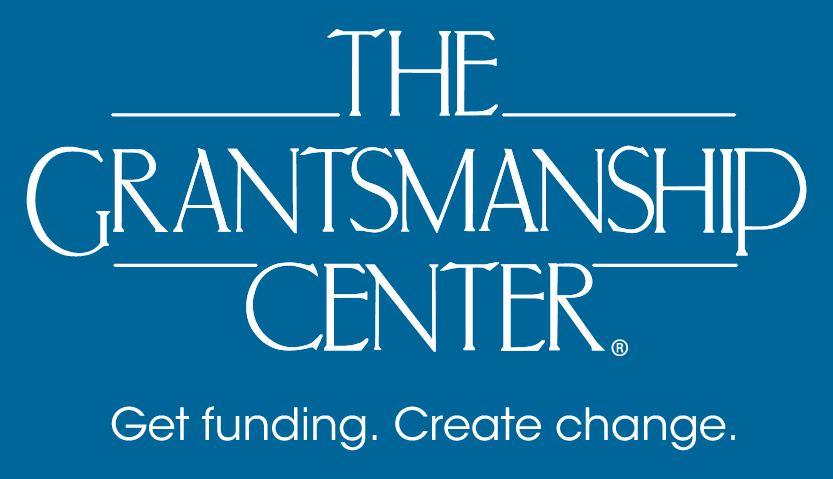
Get Funding. Create Change: Research Proposal Workshop
| Registration |
|---|
Once you're logged in, click the green "ENTER" button found in the Course Summary box to the right. Your registration will then be confirmed. |
The DMU Office of Research is pleased to offer a third grant proposal writing workshop. The Grantsmanship Center's Get Funding. Create Change: Research Proposal Workshop is designed to help both basic scientists and clinical investigators convey their ideas convincingly so proposals will be favorably reviewed and funded. This workshop addresses both practical and conceptual aspects that are important to the proposal-writing process. It is designed for both experienced and novice faculty member who have had some exposure to writing grant applications, as well as those just starting their research and grant proposal writing career.

The workshop has been designed to meet the needs of DMU, i.e., to emphasize the granting agencies that are of greatest interest to its members, including federal, private, and/or industrial sources. Emphasis has been given to such things as idea development, identification of the most appropriate granting agency, how to write for reviewers, and tips and strategies that are of proven value in presenting an applicant’s case to reviewers.
Participants will be taught to organize their presentations into a linear progression of logic, which leads reviewers through their applications. It is stressed that applicants are writing for two different audiences – the assigned reviewers, who have read the application in its entirety, and those who have read little, if anything, before the review meeting. Strategies designed to develop advocacy and a fundable priority score from both audiences will be presented.
Purpose
The purpose of the workshop is to increase the quality and competitiveness of grant proposals submitted for sponsored programs and to promote institutional research vigor. The principles of competitive grantsmanship will be explained in an interactive discourse and hands-on activities will be included to reinforce those principles.
Agenda
| 7:30 am | Registration and Breakfast |
| 8:15 am | Overview and Introductions The Grant Process: From Idea Generation to Funding
|
| 10 am | Break |
| 10:15 am | The Grant Review Process and Resubmission
|
| 12 pm | Lunch
|
| 1 pm | Diversify Your Funding Sources – Alternatives to NIH Project Description (Continued)
|
| 3 pm | Break |
| 3:15 pm | Supplementary and Supporting Materials
Writing Style and Tips |
| 4:30 pm | Adjourn |
Objectives
- Develop grant proposal content and context that is tailored to the sponsor’s priorities, regulations and review process.
- Self‐assess competitiveness as an applicant in order to enhance strengths and increase chances of success.
- Construct relevant and realistic objectives upon which to build a feasible and compelling proposal.
- Conceptualize project work plans and justifications that are focused, realistic, persuasive, and clear.
- Effectively sequence proposal writing to meet deadlines.
- Leverage university and peer resources to support proposal development, collaboration and compliance in order to enhance competitiveness.
Instructors
 Christine Kahan Black, MLS is currently Assistant Director for Research Services (2009-present) at the University of Michigan Medical School. In that role, she supports faculty in research proposal development, including training, writing and editing, obtaining reviews, and developing web resources such as proposal examples. Ms. Black has won grant awards in major federal competitions, has served as a proposal reviewer for the U.S. Department of Education, and has taught numerous grant proposal writing classes. She has served as a Senior Research Associate at the University of Michigan School of Dentistry, a Project Development Specialist in the University’s Office of Research and Sponsored Programs, and a Proposal Writing Specialist in the University’s School of Nursing.
Christine Kahan Black, MLS is currently Assistant Director for Research Services (2009-present) at the University of Michigan Medical School. In that role, she supports faculty in research proposal development, including training, writing and editing, obtaining reviews, and developing web resources such as proposal examples. Ms. Black has won grant awards in major federal competitions, has served as a proposal reviewer for the U.S. Department of Education, and has taught numerous grant proposal writing classes. She has served as a Senior Research Associate at the University of Michigan School of Dentistry, a Project Development Specialist in the University’s Office of Research and Sponsored Programs, and a Proposal Writing Specialist in the University’s School of Nursing.

Jacob E. Levin, PhD
Assistant Vice Chancellor, Research Development, University of California - Irvine
Dr. Levin has served the University since 2004, coordinating the preparation and submission process for major interdisciplinary grant proposals across campus, and has been instrumental in the development and funding of multiple campus research Centers, cross-School initiatives, capital projects, and graduate and undergraduate degree programs. He sits as a voting alternate on California's Independent Citizens’ Oversight Committee, the governing board of the $3 billion California Institute for Regenerative Medicine (CIRM), spearheaded the establishment and serves on the Oversight Board of two on-campus business incubators, and is on the board of BIOCOM San Diego. He is also a founding board member and immediate past-President of the National Organization of Research Development Professionals, and serves as a grant reviewer for agencies such as the National Science Foundation. He is a Fellow of the American Association for the Advancement of Science (AAAS). Previously, Dr. Levin was Chief Technical Officer of an MIT spin-off biomedical research startup company, Physics Faculty at Santa Ana College, and a Research Scientist at the MIT Picower Center for Learning and Memory. He received his B.A. in Physics and Math form Cornell University, an M.A. in Physics from UC Berkeley, a Ph.D. in Molecular and Cell Biology from UC Berkeley, and was a Postdoctoral Fellow in the MIT Department of Brain and Cognitive Sciences.
Relevant to the content of this CME activity, the speakers and planning committee indicated they have no relevant conflicts with commercial interests to disclose.
Commerical Support
No commercial interest provided financial support for this continuing education activity.
Continuing Education Credit
- DO: Des Moines University (DMU) is accredited by the American Osteopathic Association (AOA) and approves this activity for 6.5 Category 2-A CME credit(s).
- DPM: Des Moines University (DMU) is approved by the Council on Podiatric Medical Education as a provider of continuing education in podiatric medicine. DMU has approved this activity for a maximum of 6.75 continuing education contact hours.
- MD: This activity has been planned and implemented in accordance with the accreditation requirements and policies of the Iowa Medical Society (IMS). Des Moines University (DMU) is accredited by the IMS to provide continuing medical education for physicians.
 DMU designates this live activity for 6.75 AMA PRA Category 1 Credit(s)™. Physicians should claim only the credit commensurate with the extent of their participation in the activity.
DMU designates this live activity for 6.75 AMA PRA Category 1 Credit(s)™. Physicians should claim only the credit commensurate with the extent of their participation in the activity. - Other: This live activity is designated for 6.75 AMA PRA Category 1 Credit(s)™.
Available Credit
- 3.00 AMA PRA Category 1 Credits™
- 3.00 AOA Category 2A
- 3.00 CE Contact Hour(s)
- 3.00 CPME

 Facebook
Facebook X
X LinkedIn
LinkedIn Forward
Forward